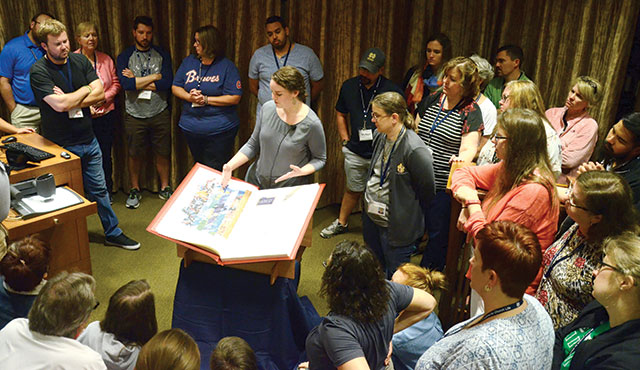Summertime is often a much-needed extended holiday for Catholic high school teachers. But this June and early July, teachers from Santa Margarita Catholic High School and Mater Dei High School were working overtime with Catholic scientists, philosophers and theologians to meet a crucial need: the integration of faith and science in their classrooms and throughout the high school curriculum.
The Science & Religion Initiative (SRI) of the McGrath Institute for Church Life (MICL) of the University of Notre Dame welcomed participants from the Diocese of Orange and many others to week-long seminars at the Notre Dame campus.
Maria Andrade Johnson, Thomas Lau, Linda Nguyen, Jorge Ledezma, and Michael Omlin represented Santa Margarita Catholic High School at the week-long Foundations Seminar, while Marla Utley, James Reynolds, and Alec Sixta represented Mater Dei High School at the advanced Capstone Seminar, offered by SRI.
“The participation by our science and religion teachers in the initiative confirms SM’s commitment to providing the most innovative and well-rounded education possible for our students. As a result of this professional growth, our teachers will be able to effectively communicate to our students the relationship between science and religion and integrate the two curriculums when appropriate,” said John Hayek, assistant principal of curriculum and instruction at Santa Margarita Catholic High School.
Since 2014, Catholic educators have joined with peers from Catholic schools across the country for the sake of building “a synthesis of faith and culture, reached by integrating all of human knowledge through the subjects taught, in the light of the Gospel,” as called for by the Vatican Congregation for Catholic Education. Since then, more than 400 high school teachers nationwide have participated in Foundations and Capstone seminars in an effort to create a new approach to professional development and classroom implementation.
SRI gives teachers official Church resources and insights to draw upon for big-picture discussions and lesson plans that break down the walls often isolating religion education from science education. The initiative equips educators to convey the complementarity of faith and reason, science and religion. The approach received international recognition in 2018 with an Expanded Reason Award bestowed by the Vatican Foundation and the University of Francisco de Vitoria.
Selected participants probe ways to help students “see scientific investigation and discoveries in the light of the Catholic faith,” said Chris Baglow, director of SRI. “To be able to connect [scientific learning] to their faith is a way of helping young people to see the glorious harmony between the Book of Nature and the Book of Scripture, which both reveal the Creator.”
Addressing the teachers at one of this summer’s seminars, Baglow suggested “bringing home to your students that, without a holistic view of the world, they’ll find it very hard to understand themselves and find it very hard to know how to act and find meaning in that world.”
They need to see how “Christianity is offering answers” in a world where divine principles endure but “there are always new horizons” for any field of knowledge to explore, Baglow said. Theology is defined as “faith seeking understanding”; that is, “it’s an activity” in which students can feel engaged.
One teacher responded to the seminar by commenting that students “shouldn’t think it means they’re less Catholic” if they have questions that go beyond their catechetical learning. In embracing questions, “they come to understand God better.”
SRI is funded by a generous grant from the John Templeton Foundation. The initiative’s summer seminars on the campus of the University of Notre Dame and at Notre Dame Seminary in New Orleans, along with “Institute Days” held for teachers in particular dioceses, assist Catholic schools with innovative professional development and interdisciplinary collaboration.

